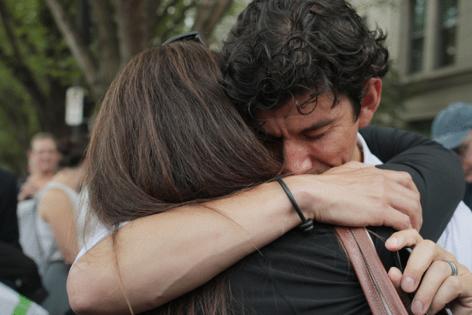Commentary: Burning down America's best tool for peace and prosperity
Published in Op Eds
On July 11, the U.S. State Department imposed sweeping layoffs as part of a large-scale reorganization. Why should this matter to you? Violence is surging across the globe — 2024 saw the highest number of state-based armed conflicts in over 70 years. In our globalized world, instability affects us whether we like it or not.
This means now is a very bad time to undermine our diplomatic capabilities, which is exactly what this will do.
Diplomacy is our least expensive and least risky foreign policy tool, and the State Department leads it. Much like preventative health care, the more effectively we invest in it early on, the fewer costly and dangerous crises we face later. If we don’t, we’ll have to rely on riskier and costlier tools to defend our national security interests, such as economic coercion or military intervention.
Because it’s less visible, diplomacy is often underrated and overlooked. It’s hard to take credit for the crises we avoid. But American diplomacy — backed up by our military might — is what kept us out of a hot war with the Soviet Union, has prevented war between China and Taiwan, and ended conflict between Egypt and Israel, to name a few. I’ve seen diplomacy mitigate conflict in places such as Kenya, Burundi and Somalia.
As a former U.S. diplomat, I know that these sloppy cuts at State will cost us a lot. As the world moves undoubtedly into a more conflict-ridden future, we are undermining our own ability to navigate that world safely.
Our military leaders have long understood this. As Gen. James Mattis said during testimony to the U.S. Senate Committee on Armed Services in 2013, “If you don’t fund the State Department fully, then I need to buy more ammunition.”
Effective diplomacy requires skilled diplomats and regional and subject matter experts. It relies on investment in the long game, building strong relationships and addressing underlying causes of conflict and instability. This administration is tossing that all aside with little concern for the consequences.
No career civil servant would deny that the State Department could use serious, thoughtful reform. But this is not that. Like the so-called Department of Government Efficiency (DOGE) cuts that came before, the State Department “reorganization” has been conducted with little appreciation or understanding of what it does, how it works and why it matters.
This is no surprise given who was put in charge of it. Jeremy Lewin, a 28-year-old former DOGE staffer with no prior experience with the State Department or diplomacy, has taken the lead. He was promoted this month to undersecretary, the department’s third-highest ranking. He’s been assisted by Lew Olowski, an entry-level Foreign Service officer who was recently tapped to lead the human resources department, a position typically held by a long-serving member of the Senior Foreign Service. Their qualifying criteria apparently consist of being loyal to the administration of President Donald Trump and willing to break things.
The result is costly and dangerous. Delaware Sen. Chris Coons highlighted some of the most egregious outcomes during a recent Senate hearing. While grilling the deputy secretary of state for management, Coons pointed out, “You literally just fired department experts on nuclear proliferation, including experts with decades of expertise on Iran’s nuclear weapons program, (on) ending Russia’s invasion of Ukraine.”
Other casualties included key parts of the counterterrorism bureau; the entire office for countering violent extremism; half of State’s cybersecurity bureau (which had a leading role in countering China’s cyberattacks); most of the office focused on science, technology cooperation and critical technologies, including artificial intelligence; much of the office addressing fraud prevention for visas and passports; and the offices focused on drug trafficking and energy diplomacy, both areas that the administration had specifically indicated were top priorities.
Widespread cuts to the Bureau of Consular Affairs (CA) were met with shock, since it serves Americans directly and is self-funded through service fees. CA issues passports and visas and is responsible for the welfare of Americans abroad.
The Office of Casualty Assistance, for example, assists victims of crime and terrorist attacks and helps repatriate bodies of Americans who die overseas. It was eliminated. I’ve made those heartbreaking calls to families to tell them a loved one has died. I’ve helped them navigate hospitals, criminal investigations, repatriation and grief — with critical support from Washington. You’ll feel these cuts if you find yourself in trouble in a foreign country.
I also know many people who were let go: experts with extensive language skills, knowledge and relationships cultivated over decades. These are taxpayer-funded investments that cannot be rebuilt overnight.
Not that this administration intends to try. It ultimately plans to slash the State Department budget by almost half, to $28 billion. For comparison, Trump’s “Big Beautiful Bill” increased military spending to over $1 trillion, which is $156 billion more than the Department of Defense asked for. This means the U.S. military got a tip nearly six times the entire planned State Department budget.
If you don’t mind a future with more war, we can just keep buying more ammunition. But if you want a safer world, tell your government to invest in the tools of peace.
____
Elizabeth Shackelford is senior policy director at Dartmouth College’s Dickey Center for International Understanding and a foreign affairs columnist for the Chicago Tribune. She was previously a U.S. diplomat and is the author of“The Dissent Channel: American Diplomacy in a Dishonest Age.”
___
©2025 Chicago Tribune. Visit at chicagotribune.com. Distributed by Tribune Content Agency, LLC.

























































Comments